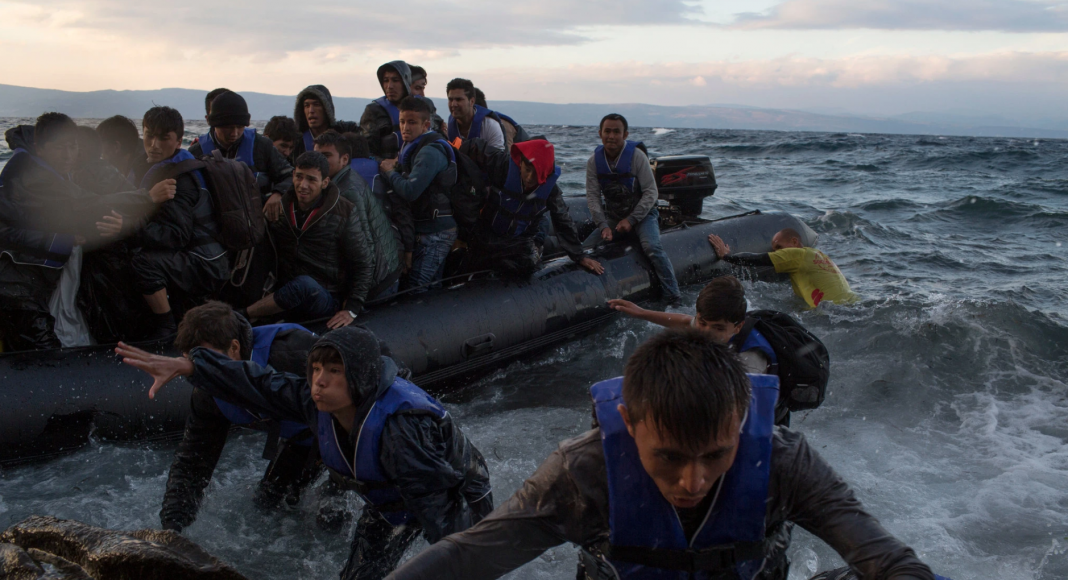As Greece struggles to deal with a seemingly endless influx of migrants from neighbouring Turkey, the conservative government has a contentious new plan to respond to the problem: a floating net barrier to avert smuggling boats.
But rights groups have condemned the plan, warning that it would increase the perils faced by asylum seekers amid growing tensions at camps on the Aegean Islands and in communities there and on the mainland. The potential effectiveness of the barrier system has also been widely questioned, and the center-right daily newspaper Kathimerini dismissed the idea in an editorial on Friday as “wishful thinking.”
Moreover, the main opposition party, the leftist Syriza, has condemned the floating barrier plan as “a disgrace and an insult to humanity.”
The authorities aim to install a 1.7-mile barrier between the Greek and Turkish coastlines that would rise more than 19 inches above the water and display flashing lights, according to a description posted on a government website this past week by Greece’s Defense Ministry.
Citing an “urgent need to address rising refugee flows,” the 126-page submission invited private contractors to bid for the project that would cost an estimated 500,000 euros, or more than $554,000, including the cost of four years of maintenance. The government is expected to assign the job in the next three months, though it is unclear when the barrier would be erected.
Greece’s defense minister, Nikolaos Panagiotopoulos, told Greek radio on Thursday that he hoped the floating barrier would act as a deterrent to smugglers, similar to a barbed-wire fence that the Greek authorities built along the northern land border with Turkey in 2012.
“In Evros, physical barriers had a relative impact in curbing flows,” he said. “We believe a similar result can be achieved with these floating barriers.”
The construction will be overseen by the Defense Ministry, which has supervised the creation of new reception centers on the Greek islands and mainland in recent months, and will be subject to “nonmilitary specifications” to meet international maritime standards, the submission noted.
A spokesman for Greece’s government, Stelios Petsas, said the barrier system would have to be tested for safety.
But rights activists warn that the measure would increase the dangers faced by migrants making the short but perilous journey across the Aegean. Amnesty International’s research director for Europe, Massimo Moratti, condemned the proposal as “an alarming escalation in the Greek government’s ongoing efforts to make it as difficult as possible for asylum-seekers and refugees to arrive on its shores.”
He warned that it could “lead to more danger for those desperately seeking safety.”
The head of Amnesty International’s chapter in Greece, Gavriil Sakellaridis, questioned whether the Greek authorities would respond to an emergency signal issued by a boat stopped at the barrier.
The European Commission has expressed reservations and planned to ask the authorities in Greece, which is a member of the European Union, for details about the proposal. Adalbert Jahnz, a commission spokesman, told reporters in Brussels on Thursday that any Greek sea barriers to deter migrants must not block access for asylum seekers.
“The setting up of barriers is not in and of itself against E.U. law,” he said. “But physical barriers or obstacles of this sort should not be an impediment to seeking asylum which is protected by E.U. law,” he said, conceding, however, that the protection of external borders was primarily the responsibility of member states.
The barrier was proposed amid an uptick in migrants from Turkey. The influx, though far below the thousands of daily arrivals at the peak of the crisis in 2015, has put an increasing strain on already intensely overcrowded reception centers.
According to Greece’s migration minister, Notis Mitarakis, 72,000 migrants entered Greece last year, compared with 42,000 in 2018. The floating barrier will help curb arrivals, Mr. Mitarakis said.
“It sends out the message that we are not a place where anything goes and that we’re taking all necessary measures to protect the borders,” he said, adding that the process of deporting migrants who did not merit refugee status would be sped up.
“The rules have changed,” he said.
Greece has repeatedly appealed for more support from the bloc to tackle migration flows, saying it cannot handle the burden alone and accusing Turkey of exploiting the refugee crisis for leverage with the European Union.
Repeated threats by Turkey’s president, Recep Tayyip Erdogan, to “open the gates” to Europe for Syrian refugees on his country’s territory have fueled fears that an agreement signed between Turkey and the European Union in 2016, which radically curbed arrivals, will collapse.
Growing tensions between Greece and Turkey over energy resources in the Eastern Mediterranean and revived disputes over sovereignty in the Aegean have further undermined cooperation between the two traditional foes in curbing human trafficking, fragile at the best of times.
The Greek government of Prime Minister Kyriakos Mitsotakis is also under growing pressure domestically since it came to power last summer on a pledge to take a harder line on migration than that of his predecessor, Alexis Tsipras of Syriza.
Plans unveiled in November to create new camps on the Aegean Islands have angered residents, who staged mass demonstrations last month, waving banners reading, “We want our islands back.”
Rights groups have also warned of the increasingly dire conditions at existing camps on five islands hosting some 44,000 people, nearly 10 times their capacity.
Sourced via New York Times.
